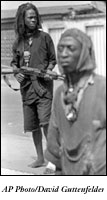Côte d’Ivoire: Despite promises to respect press freedom, military regime cracks down on local media
Your Excellency: The Committee to Protect Journalists (CPJ) is deeply disturbed by several serious, recent press freedom violations in Côte d’Ivoire. Upon seizing power in December 1999, Your Excellency promised that freedom of expression would be respected. Since then, however, soldiers close to the ruling National Public Salvation Committee (CNSP) have conducted raids on several Abidjan-based publications.
Attacks on the Press 1999: Preface
By Philip GourevitchNearly a hundred years ago, in Boston, the Congo Reform Association published a pamphlet by Mark Twain, titled King Leopold’s Soliloquy, A Defense of His Congo Rule (1905). The text is an imagined monologue by the Belgian monarch, delivered as he reads through stacks of literature protesting the systematic murder and mutilation of…
Attacks on the Press 1999: Introduction
By Ann CooperAs a foreign correspondent covering the Soviet Union a decade ago, I was an eyewitness to a dramatic example of the press’ critical role in building democracy. Granted a bit of freedom by Mikhail Gorbachev’s mid-1980s glasnost policy, long-suppressed Soviet journalists set their own daring agenda: they probed forbidden history, investigated contemporary corruption,…
Attacks on the Press 1999: Africa Analysis
By Claudia McElroyAll over Africa, conflict continued to be the single biggest threat to journalists and to press freedom itself. Both civil and cross-border wars were effectively used as an excuse by governments (and rebel forces) to harass, intimidate, and censor the press–often in the name of “national security”–and in some cases to kill journalists…
Attacks on the Press 1999: Enemies of the Press
Each year on World Press Freedom Day (May 3), CPJ announces its list of the ten worst enemies of the press. Those who made the list this year, as in the past, earned the dubious distinction by exhibiting particular zeal in the ruthless suppression of press freedom. They were singled out for their unrelenting and…
Attacks on the Press 1999: 1999 Death Toll: Listed by Country
[Click here for full list of documented cases] At its most fundamental level, the job of a journalist is to bear witness. In 1999, journalists in Sierra Leone witnessed rebels’ atrocities against civilians in the streets of Freetown. In the Balkans, journalists watched ethnic Albanians fleeing the deadly menace of Serbian police and paramilitaries. In…

Attacks on the Press 1999: The Trauma of Sierra Leone
Introduction On January 6, 1999, rebel forces entered Freetown and launched a campaign of terror. Revolutionary United Front (RUF) fighters systematically murdered, mutilated, and raped thousands of civilians. During the three weeks that it took for Nigerian-led West African peacekeeping troops to expel the rebels from Freetown, Sierra Leone officially became the most dangerous country…
Attacks on the Press 1999: Burkina Faso
President Blaise Compaoré seized power in 1987 before seeking legitimacy through the ballot box in 1991 and again in 1998. But his regime still draws much of its authority from the army, especially from the infamous Presidential Guard Regiment (RSP), which local independent journalists blamed for several extrajudicial killings last year. It remains dangerous to…
Attacks on the Press 1999: Ivory Coast (Côte D’ivoire)
“Press freedom will be total,” promised Gen. Robert Gueï, Côte d’Ivoire’s new head of state. General Gueï, 58, who overthrew the government of President Henri Konan Bedie on Christmas Eve, made this announcement just hours after his nine-man junta imposed a dusk-to-dawn curfew in this west African country, historically noted for its political stability. However,…
Attacks on the Press 1999: Liberia
The Liberian press has been given to self-censorship ever since Charles Taylor and his National People’s Party won a landslide victory in the July 1997 elections that officially ended the war that Taylor himself started on Christmas Eve 1989. Although local media have criticized the Taylor government on social-service and devel-opment issues, they have generally…